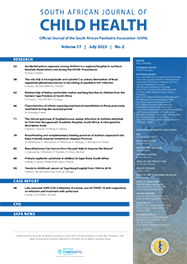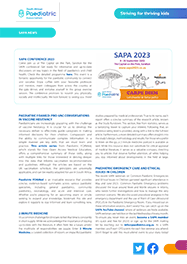Articles

Hearing screening follow-up return rate in a very low birth weight project: A retrospective record review
Abstract
Design. This was a retrospective, passive archival design. Data were collected from the VLBWP records and participant files from the Department of Audiology, Charlotte Maxeke Johannesburg Academic Hospital.
Setting. Charlotte Maxeke Johannesburg Academic Hospital, South Africa, a public sector hospital.
Subjects. Eighty-six participants were included for retrospective analysis, consisting of 35 males and 51 females with a birth weight range of 680 - 1 500 g.
Outcome measures. Return rate for all neonates referred for follow-up oto-acoustic emissions screening.
Results. Of the 86 neonates who were referred for a follow-up screening, only 31.4% (27) returned for a repeat outpatient hearing screening appointment.
Conclusions. The follow-up return rate is significantly poor and may influence implementation of early hearing detection and intervention (EHDI). Efforts to improve the return rate should be intensified. These may involve parental education and counselling, as well as involvement of nursing staff and medical professionals in implementation of EHDI programmes. It may be possible to improve follow-up by aligning follow-up screening with the day of neonatal follow-up clinics in provincial hospitals where such services are available, including it in such clinics, or ensuring follow-up screening at immunisation clinics closer to where patients live.
Authors' affiliations
Amisha Kanji, Department of Speech Therapy and Audiology, University of the Witwatersrand
Katijah Khoza-Shangase, Department of Speech Therapy and Audiology, University of the Wiwatersrand
Daynia Ballot, Department of Paediatrics and Child Health, University of the Witwatersrand
Full Text
Keywords
Cite this article
Article History
Date published: 2010-12-08
Article Views
Full text views: 1952

.jpg)



Comments on this article
*Read our policy for posting comments here